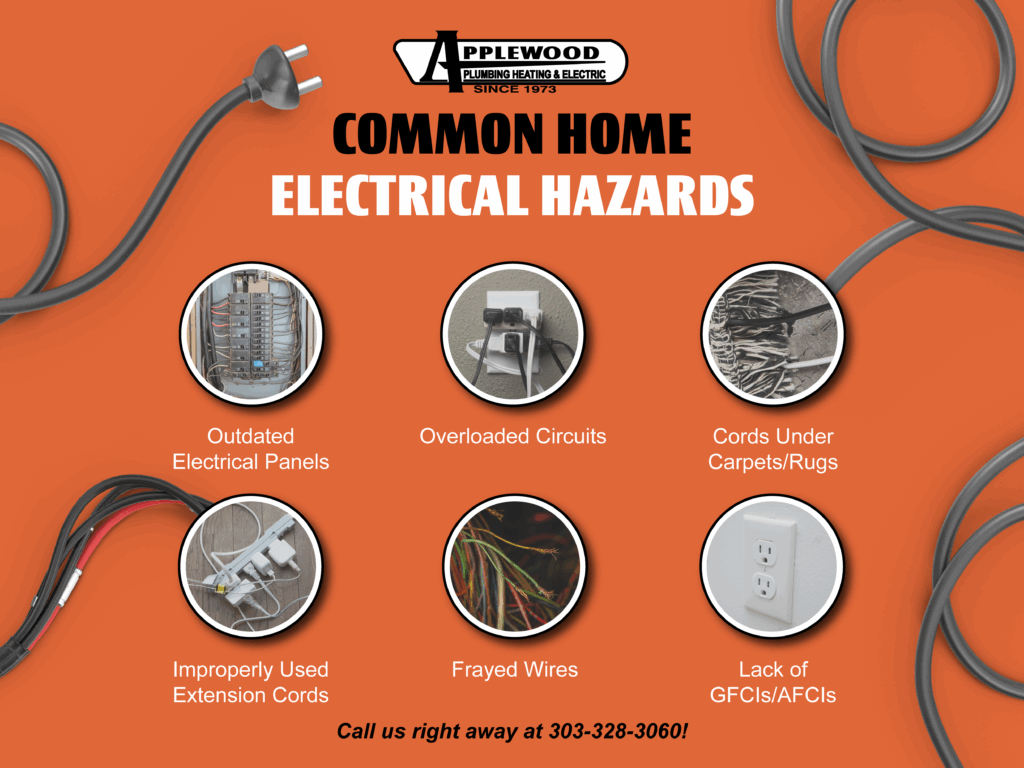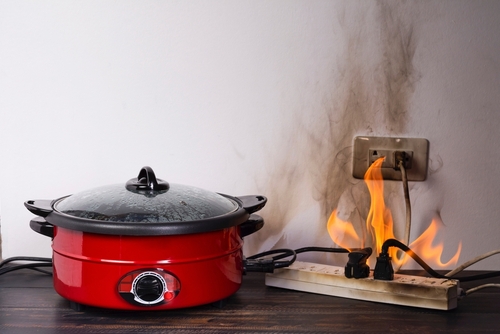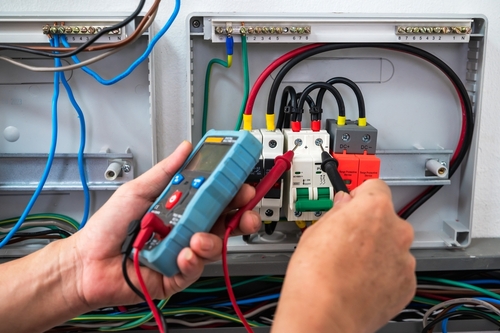August 11, 2025
Electrical Safety 101: Common Hazards in Your Home
Electrical safety is not an area of home maintenance you want to push off until “someday.” The National Fire Protection Association (NFPA) estimates that electrical equipment is involved in over 31,000 home fires each year, causing a collective $1.6 billion in property damage. Protect your home and your family from house fires, electrocutions, and other electrical hazards by reading on for our expert advice.
When in doubt, call your local licensed electrician, like the ones at Applewood. Our technicians are committed to providing safe, expert electrical service and advice—it’s just one way we ensure electrical safety for homeowners in the Denver/Boulder area and beyond.

Why Electrical Safety Matters
Poor electrical maintenance is associated with increased risk for home fires, electric shocks, energy inefficiency, higher energy bills, and more. Some of these dangers of electricity can be life-threatening, so keeping them top of mind is crucial for your family’s safety.
The National Electric Code (NEC) is the standard for safe installation, operation, and maintenance of electric power. Following its guidelines isn’t just mandated in Colorado—it’s absolutely essential for electricity safety in the home and beyond.
Common Electrical Hazards Found in Homes
Especially in older homes, these issues are common:

- Overloaded circuits: Circuits can only handle so much wattage, so ensure you’re not overloading your system by checking the listed wattage before plugging items in.
- Extension cords: The NFPA has found that a significant number of house fires are associated with extension cords. When buying an extension cord, match it to its use—indoor vs. outdoor, for example—and avoid overloading it or using it as a permanent fix.
- Outdated electrical panels: Older homes typically can’t keep up with the demand that today’s appliances and EV chargers require. And if your home still runs on fuse boxes, it’s time for an upgrade.
- Frayed or damaged wires: Visibly defective wires are a huge red flag—call an electrician right away to avoid fires and electrical shocks.
- Improper use of appliances: Plugging too many appliances into the same outlet or adding high-energy-usage appliances to an undersized system can cause shorts and more serious issues.
- Lack of Ground Fault Circuit Interrupters (GFCIs) or Arc Fault Circuit Interrupters (AFCIs): AFCIs and GFCIs are required in today’s homes. If it’s been too long since your electrical wiring was upgraded, you’ll need AFCIs and GFCIs added. They’re essential for preventing electrical fires.
In short, be mindful of the items you’re plugging in and keep an eye out for visibly damaged electrical work so you can identify potential issues early. Additionally, a regular electrical inspection by a licensed electrician—like the ones at Applewood—can keep your electrical hazard potential low and your home safe.
Electrical Safety Tips for Homeowners
Following these everyday electrical safety tips can help keep your home safe between inspections:
- Avoid DIY electrical fixes—call licensed professionals like Applewood.
- Use childproof outlets.
- Maintain appliances and cords.
- Install smoke detectors near electrical equipment.
- Don’t permanently use extension cords.
- Don’t connect too many appliances to one outlet, and pay attention to appliance wattage so you don’t overload the circuit.
- Always plug large appliances into wall outlets, never into extension cords or plug strips
- Keep decorations at least 3 feet away from heat sources.
- Replace appliances that repeatedly blow fuses or trip breakers.
- Don’t cover cords with rugs, carpets, furniture, etc.
- Don’t nail or staple cords into place.
- Inspect holiday lights for cracked or damaged sockets or loose wires, and don’t connect more than three strings of lights together.
When to Call the Experts

Red flags that indicate an electrical safety risk include: dim/flickering lights, arcs/sparks, sizzles, overheating outlets, strange smells, loose plugs, and damaged insulation.
If you notice any of these signs, call your electrician. From inspections to upgrades to emergency repairs, an electrician can diagnose and fix your problem quickly and safely. Book your Applewood electrical safety inspection today for peace of mind.
The Role of Regular Electrical Safety Inspections
Electrical safety inspections are one of the most efficient ways to ensure your home is safe and compliant with local codes. Inspections align with risk assessments and identify potential hazards before they become a problem. The average electrical safety inspection works like this:
- Visual Inspection: Your electrician will look for exposed, frayed, or outdated wires, as well as damaged outlets, switches, and light fixtures. These signs can be symptoms of overheating or arcing in your electrical system.
- Electrical Panel Inspection: The technician will determine whether your panel is up to code and whether it may be overloaded. They’ll make sure grounding and bonding systems are intact, and they’ll even properly label breakers if not already done.
- Testing Outlets and Switches: Voltage levels will be checked and grounding will be verified. GFCIs will be tested in kitchens, bathrooms, and outdoor areas, and AFCIs will be inspected in homes that have them.
- Load Assessment: The demand placed on your electrical system should be within its capacity. The electrician will identify any overloaded circuits or appliances that draw excessive power and recommend a solution.
- Appliance & Fixture Inspection: Your electrician will check the age and safety of your appliances—think HVAC, stove, washers, dryers, and refrigerators—and ensure they’re being properly powered and not overloading your system.
- Outdoor & Utility Line Checks: Any applicable outdoor panels, detached structures, and overhead power lines should also be inspected for weather-related wear and tear or clearance issues.
- Evaluation Against Code Compliance: Any variances from local and national electrical codes will be noted.
- Safety Recommendations & Risk Assessment: At the end, your electrician will provide you with a full risk assessment report, highlighting potential hazards and offering recommendations for mandatory or suggested fixes.
When Should Homeowners Schedule Inspections?
If it’s been a few decades since your home’s last electrical safety inspection, a lot has changed! 40 years is the standard benchmark between inspections. You can find inspection dates listed on the door or cover of your electrical panel.
Additionally, electrical systems should be inspected after renovations or if substantial electrical loads like new appliances or extension cords have been added.

The Importance of Professional Electrical Safety Training
DIY electrical work is never the answer—and we’re not just saying that because we’re licensed electricians! Performing electrical work without proper training, precautions, or equipment is dangerous and can put your home at risk long-term, even if you complete the job unharmed.
Professionals, like the technicians at Applewood, are highly trained and licensed to meet safety standards and national and local codes. They have years of experience, so they know what to do and how to do it safely, efficiently, and quickly.
Schedule Your Applewood Inspection
Ensure your home is safe and up to code by contacting Applewood’s licensed electricians for an inspection. Staying proactive about electrical safety is crucial—and luckily, Applewood makes it easy. Our Service Club means you’ll get access to priority discounted service, and our Coupons and Financing pages can help you save on your electrical service.
Enjoy peace of mind knowing your home is protected from common electrical hazards. Call to schedule your Applewood home evaluation today!


